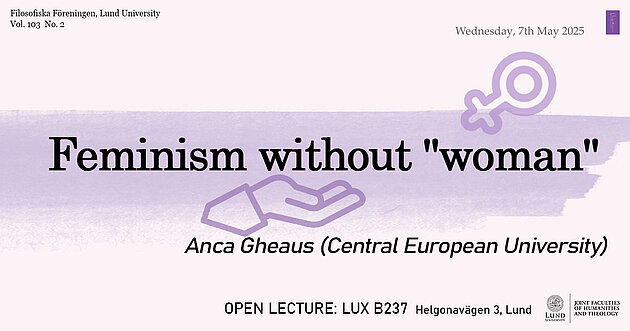maj
Lund Philosophical Society: Anca Gheaus "Feminism Without 'Woman'"

Lund Philosophical Society invites everyone to attend Anca Gheaus' talk "Feminism Without 'Woman'" on the 7th of May at 18:15 in LUX: B237.
Dear friends and members of the Lund Philosophical Society,
We are pleased to announce our 4th speaker of 2025: Anca Gheaus, Associate Professor in Philosophy at the Central European University in Vienna. She will give a talk titled "Feminism Without 'Woman'"on May 7th at 18:15 in LUX: B237.
Abstract: Feminism Without "Woman"
“Woman” has become a contested term. Some believe it is, or should be used as, a sex term, while others that it is, or should be used as, a gender term (referring to a social role, or a certain identity.) Reasons that support employing “woman” as a sex concept rule out its employment as a gender concept, and the other way around. Moreover, “sex”, “gender” and “gender identity” are also subject to radical contestation. These cleavages are undergirded by metaphysical and ethical disagreements which reasonable individuals are unlikely to settle. They jeopardise the feminist project, defined as it has always been by reference to “woman”. They also jeopardise the ability of feminists and non-feminists alike to debate together practical matters concerning the treatment of individuals according to their sexual and gendered features, and, most notably, the issues of separate spaces. I suggest that the threat to the feminist project can be overcome if we think of feminism as a coalition against unjustified, and primarily against sexist, gender norms. I also argue that it is possible to engage in public debates without talking about “women”. In particular, states can and should offer justifications for their policies by reference to the discrete biological facts (such as hormones, chromosomes, gametes or sexual morphology) and/or gender facts (such as gender roles, gender socialisation, internalised gender norms). It is such facts that are already assumed, by the parties to the debate, to have normative significance. Following this suggestion would yield a complicated and messy normative picture, and would not in itself resolve substantive moral disagreements; but it would improve the chance to articulate the disagreements – thus getting the conversations unstuck – and may be the only way compatible with mutual toleration and respect.
As always, the talk will be followed by an informal reception in the Department of Philosophy's staff room.
